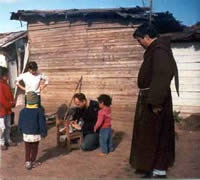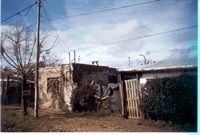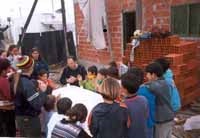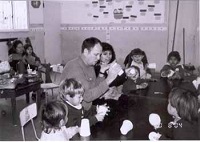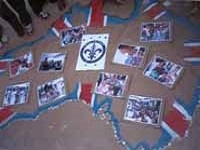Last year while visiting Argentina for the first time I had a dream.
I wanted to return to South America with my son and do what I could to share my passion for music and in doing so, share my joy and goodwill with fellow humans. With the support of St Aloysius College and St Ethnea College, many of my dreams have come true.
I can’t say that emotionally I am completely intact. I can’t say that physically and psychologically I am as I was. Joshua ‘también’, as well. We have probably experienced far too much in 15 weeks. Far too many highs and some incredibly disturbing and shocking lows.
I don’t like seeing a baby of 6 months being mothered by a child of 6 years.
I don’t like seeing the baby’s ears clogged with earwax and face encrusted with mucus.
I don’t like seeing women and children living in shelters, fearful for their lives from physically and sexually abusive male partners.
Poverty itself is disturbing but add child abuse as a daily occurrence and I am horrified.
Add middle class enclaves perched opposite the poorest barrios.
Add ten-foot high razor wire, shotgun-wielding security guards with German shepherds patrolling the rich neighbourhoods that sit alongside the poor.
When you are in the home of an appallingly poor person, being offered the opportunity to drink ‘mate’ with them and experience their overwhelming joy and appreciation at your visit, you begin to understand their difficult life (mate is a tea that is drunk from a metal straw and is communally shared).
There is sometimes no electricity except what can be stolen from a government line. Often the only water available is what they can carry from a Comedor, a place where people bring a plastic container and receive food at no cost. In some ways these centres are causing more problems as people are becoming reliant on them and forgetting how to cook. Barrios homes often have no ´baño’, toilet. Walk through their homes and you experience poverty. Think Harlem, then times it by ten.
Clothing worn by the children is often supplied by Caritas or local religious or mercy workers and disguises their poverty. Argentina, with its Italian influence, pays a great deal of attention to dressing with style even in the poorest of the poor communities.
Twenty million people are living in poverty in Argentina. Eight million of them are in barrios or ‘shanty towns’. Their population is often increased by displaced people from the provinces and from neighbouring countries such as Paraguay.
Yesterday it was raining. Rain in the barrios means no school. No anything! You can’t walk down the streets. Every foothold is slippery with mud. It took us 15 minutes to walk to our car, two or three streets away. Josefina, a fantastic social worker and child psychologist, was almost slipping to the ground with every step. I had to laugh – you need a laugh when working in the barrios.
So… rain means no school. If the government wanted to help educate the children of the barrios, it would give them a road. No cars, no bicycles can be seen and only the foolish try to walk the slippery streets.
The mercy workers, or social workers if you object to the word ‘mercy’, try to make a difference but it was not so long ago, under the now deposed ‘military regime’, that these people were arrested and never seen again.
Today I visited a social project in the barrios supported by middle class teachers who commute one hour and give up their Saturday morning to teach maths to the children of the barrios.
‘I love it’, said one ‘English’ teacher who teaches maths. ‘I get to experience real appreciation that I don’t see from the middle class kids. These kids give so much love back to someone willing to help them.’
Education is a privilege.
Dare to dream.
When I arrived at St Ethnea and outlined my goals to the pastoral team, I expressed a desire to give mercy a higher profile at the school. I described a typical coin day fundraiser at SAC and patiently explained the concept in detail.
11 de Agosto, St Ethnea had a coin day!
It was an amazing effort by the pastoral team. 450 pesos were raised in just 30 minutes. This is a lot of money in Argentina. A huge painted circle, a circle of mercy, surrounded two maps of two very different countries – Australia and Argentina. Within the maps were photos of last year’s visiting St Aloysius College choir. Joining the two maps, in a bridge, were the letters spelling the words, Misericordia, Mercy.
Dare to dream.
I envisaged a music program at St Ethnea. On ‘Coin Day’ the newly formed St Ethnea orchestra performed five songs. ‘Hot Cross Buns’ again proved to be a crowd pleaser.
Later that day I travelled to four different projects in the barrios.
After a lunch with the Sisters of Mercy and my obligatory performance of ‘The Cup Dance’ I visited a Cultural Centre being developed by a young Sister Florencia. The plastic cup, dancing and football with the barrios kids were the highlights – maybe not the dancing!
Then it was off to a shelter for older women without families. Sister Martha had me again play The Cup Dance. She is trying to develop in these women a sense of self-respect, self-esteem and social community.
The next stop was to a women and children’s shelter. A shelter for violently abused women and children of the barrios who have escaped terrible circumstances. The Cup Dance was tested here (these kids were very distrustful of a male visiting them).
I loved these kids and we ended up sitting on the floor playing cars by dragging them along the slippery floor under the table. They didn’t believe any of my scuba diving shark stories though! The little girl with a toy phone stole my heart.
Dare to dream.
I came to Argentina to share my love of music. It has taken me from Guarani Indian reservations to some of humanity’s most difficult situations. My music has largely been expressed in the form of a plastic cup performance, thanks to Susie Mashtoub not the 4 years at the University of Adelaide.
I have played the cup dance for about 1500 people. I have played it many, many times. I have played Phantom of the Opera as a percussionist 2000 times, so this is easy! When I look at the smiles on the faces of these children, the abused women, Sisters of Mercy and mercy workers, I never feel tired of performing it. I feel privileged.
Just the other day, I was introduced as a ‘Musical Magician’. I loved that! I love it when the kids call me Professor (my ego is always a problem!). I love it when I visit my local supermarket and they call me ‘Maestro’.
How will I leave Argentina? Maestro! It’s too much. There is a God.
I love Argentina.
I wonder how I will leave these smiles. How will I leave these wonderful new friends in just 5 weeks? I have met some extraordinary people in my time here. Many of them taxi drivers who I think have been responsible for my Spanish practice.
Josh and I have not found it all easy. Our relationship is strong and always has been strong but the last 15 weeks has been a whirlwind of emotion and excitement.
Life in the barrios is not easy. Life in Argentina is not always easy but…I love these people and their country. I love their generosity and passion for life.
Dare to dream.
I dared to dream and my dream came true.
Thank you to all who have supported the work I am doing here.
Thank you to Sister Judith who gave me this opportunity.
Thank you to Carol Grantham who has developed, edited and supported this project’s website.
Thank you to Kathryn Beilby, Christine Simpson, John Konopka, Nick K. and many, many, many others who write to me when I feel overwhelmed.
As you can see from the above, departing will be difficult. But there is still a lot of work left.
A crazy beautiful experience in Argentina. I’ll worry about my retirement later.
Te mando un beso
Love
Craig

